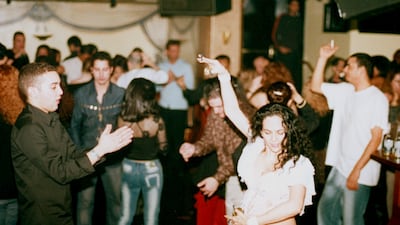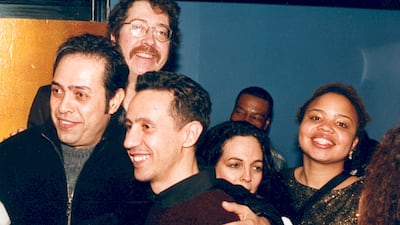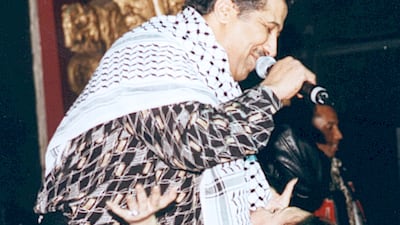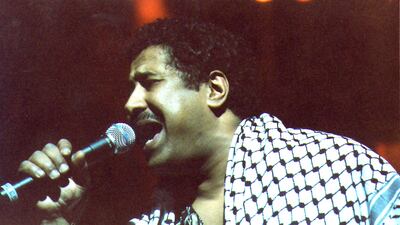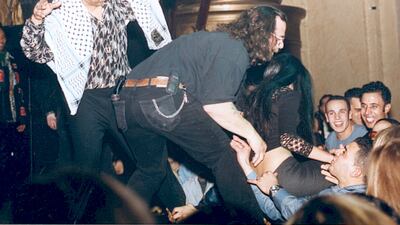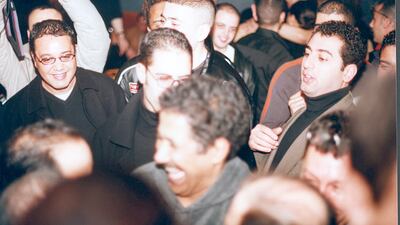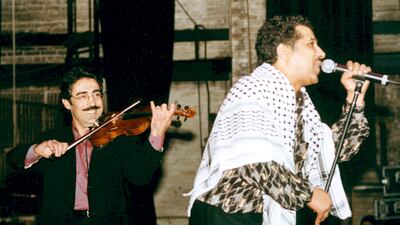When two planes struck New York's twin towers on September 11, 2001, some of the Arab world’s biggest voices were in airports en route to the city.
Algerian rai star Khaled was in Paris’s Charles de Gaulle Airport queuing to check-in. Egyptian pop star Hakim was in Cairo International Airport with his 18-piece band.
Iraqi crooner Kadim Al Sahir and Tunisian singer Amina Annabi were also making preparations, from Dubai and Paris respectively, before their flights to the US in the next few days.
The congregated acts were due to embark on a 21-city US tour showcasing the best of Middle Eastern music, with the first show scheduled for New York City’s Beacon Theatre on September 15.
The artists – together with Palestinian-American oudist Simon Shaheen and his Qantara ensemble, Iranian violinist Bijan Mortazavi and Pakistan's Riffat Sultana & Party – were meant to regroup in the city and prepare for a two-month run of shows spanning both coasts of the US.

Such an ambitious trek was warranted. At the time, interest in regional music was at an all-time high in the US.
The brooding bilingual track Desert Rose, featuring English pop star Sting and Algerian rai singer Cheb Mami, was at the top of the world music charts and heard by millions through its use in a television campaign by car manufacturer Jaguar.
The tour’s producer, Lebanese-American Dawn Elder, not only wanted to pounce on the interest, but finally elevate the status of Arabic music in the US beyond belly dancing performances and club shows.
The Desert Roses & Arabian Rhythms tour was meant to reset the conversation surrounding Middle Eastern music and culture in the US. However, it was rendered mute once news arrived of the Al Qaeda attacks on the World Trade Centre, which killed 2,753 people.
“The realisation that it was, in fact, carried out by people who were Middle Eastern really changed the situation,” Elder tells The National.
“We were not even thinking about the shows. The idea of the tour was the farthest thing from our minds and our hearts were with everyone out there.”
Cooling the temperature
While the tour was initially nixed, further tragedy on the ground caused some of the artists to converge again for a series of powerful shows.
"People were getting racially profiled and acts of violence were committed on innocent people just because they looked Middle Eastern," Elder recalls.
“We were hearing all these horror stories from different parts of the country, one crime after another, and we just felt like we needed to do something, change the conversation.”

To help cool some of the simmering rage, Elder co-produced the Oasis of Peace tour, which started on September 15, 2001, in Chicago and finished in New York in December.
“The essential message of the tour was that Arab-Americans are part of the cultural tapestry that makes up the country,” Elder says.
“They should not be subjected to hate crimes or other forms of violence, because that's what happened after 9/11.”
Kicking off the first round of shows was Shaheen before Annabi joined the tour when it reached the Big Apple.
“I didn’t have to think about it, I knew I had to be there,” Annabi tells The National.
"I wanted to contribute because this is the destiny of musicians and artists. We are healers and this is what we are born to do.
“It was important to show that Arabs come from different cultures and that the Muslim community is also concerned with what is going on in the world.”
And what was the audience's reaction? Elder describes the shows as a "slow burn".
“What would normally happen is by the fourth song people would really respond, and by the end of the show they would all be clapping non-stop.”
On the road again
Buoyed by the reception, Elder decided to resume the Desert Roses & Arabian Rhythms tour in February 2002.
Even with Saher no longer available, it remained a formidable bill with Khaled and Hakim leading a line-up that included Shaheen, Annabi and Bassam Saba, the Lebanese ney (flute) player and composer who co-founded the New York Arabic Orchestra before succumbing to Covid-19 last year.
Heightened airport security in the wake of the attacks resulted in some gruelling journeys, Elder recalls.
“There were interviews and strip searches frequently,” she says.
“What didn’t help was that musicians generally carry all these strange and tattered cases. It was eventually understood by officials that these cases carry things like the doumbek (goblet drum) and the riq (Arabic tambourine).”
The troupe used bleak humour to cut some of the tension caused by touring.
“It became a game in the end, who will be the next person to be strip searched,” Annabi recalls. “We would say ‘oooh, who will be the target tonight?'”
We need to talk
Elder is under no illusions about the impact of the Oasis of Peace and Desert Roses & Arabian Rhythms tours.
While residual anti-Arab and Muslim sentiment still remains two decades after the 9/11 attacks, she credits the musicians for starting a much-needed dialogue amid turbulent times.
It’s a discussion that needs to continue today on a global scale as we all struggle with the aftereffects of the pandemic.
“The 3,000 people who died in 9/11 was such a horrible and senseless loss, but now with Covid-19 we are also seeing the senseless loss of more than four million people," Elder says.
"And we have to, like we did with 9/11, find reasonable ground. I feel that music also has a role to play in creating a space where people can reasonably talk to each other without shouting, screaming or using violence.”
